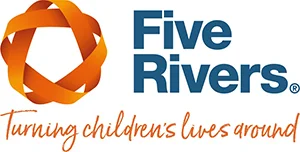The use of Plain English helps children overcome emotional difficulties
Tuesday 11 September 2018
Last updated: Wednesday 16 June 2021
As adults, we should ensure that all the children and young people we work with have a voice that is heard. Five Rivers’ Keep It Plain campaign seeks to ensure that children and young people can be more involved in their own care. Ultimately, this can lead to better outcomes for our children and young people. In the first of a series of blogs about communications, Olivia, our Participation and Engagement officer explains how:
What is Plain English?
Plain English is presenting information so that in a single reading, the intended audience can read, understand and act upon it. Plain English means writing with the audience in mind and presenting information clearly and accurately.
Respect = Listening
The governing principles of our ‘Children’s Charter’ promotes respect and listening to our young people and our “Keep It Plain” campaign is an important part of the way we work. All communications with looked after children and the language we use around them must be easy to understand and relevant to them.
Keeping our language simple and easy to understand helps our children and young people to assess their rights and engage in how we care for them. Making designs accessible, whilst being child-friendly, appealing and fun, ensures that the information is made available to as many children and young people as possible and increases their participation and engagement.
Complicated content and long words have a negative impact on emotions
Children and young people living in care have so much paperwork to read and to deal with. Every aspect of their lives is documented. We really want them to engage in the plans and reviews we write about them, but all too often they are ‘too long, too complicated and too boring’.
This was the feedback we received from 14-year-old Emily, a fostered child who went on to work with us on the development of our Keep It Plain initiative:
“I often get big words in my reports, because they are big words and I can’t understand them, I sometimes lose interest. Sometimes they make me feel confused, worried, crazy and stupid. I can get worried that I’m missing something that is important. I get afraid to ask because I don’t want to look stupid”.
The view of a Clinical Child Psychologist
According to Jade Ark, Clinical Child Psychologist, this emotional response is not surprising. Children and young people who are looked after often have decisions made about them and for them but they may not always feel involved in these decisions. Reports full of jargon can leave young people feeling that what is written about them is disconnected from their actual experience. This may lead to children and young people feeling disempowered and silenced and these feelings may mirror their early experiences.
Our ‘Keep it Plain’ editors
Working with Emily and other young participants we created our in-house team of Keep It Plain young editors. They are now asked to approve any document, piece of literature or film for ease of reading and understanding before distribution. Every piece bears the Keep It Plain (KIP) stamp of approval with the name of who approved it. The children are rewarded and recognised for their contribution with vouchers to say thank you.
This collaborative approach has paid dividends for Five Rivers Fostering – we won a second National Plain English Award for our ‘Welcome to your Foster Home’ bag of resources and information, and our communications work is key to our Investing in Children™ status for our fostering services.
How to improve your communications with children in care
You can help improve your children’s understanding of their world and improve their emotional responses to key paper work. We can all make simple changes and make things better for children and young people we work with.
- Write documents with your child in mind
- Don’t use abbreviations or acronyms
- Explain any terminology they might not understand
Further information and advice
Visit the Plain English website www.plainenglish.co.uk or download the guide on ‘How to write in Plain English’ available from www.plainenglish.co.uk/files/howto.pdf
I hope that these tips will help you when you next have to write information or reports about a looked after child so that they can understand what is written about them and ensures that their voice is heard.
For more information about our Youth Council and Children’s Charter, visit our participation and engagement pages.
(This blog is an edited version of an article first published in Foster Talk Magazine)
